精讲_小学英语一般现在时讲解及联系
- 格式:doc
- 大小:100.50 KB
- 文档页数:10
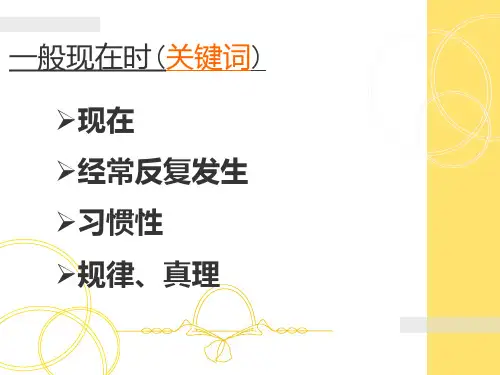
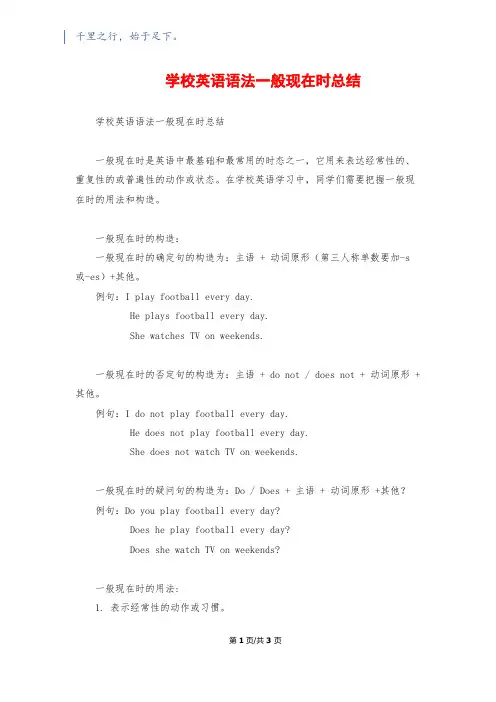
千里之行,始于足下。
学校英语语法一般现在时总结学校英语语法一般现在时总结一般现在时是英语中最基础和最常用的时态之一,它用来表达经常性的、重复性的或普遍性的动作或状态。
在学校英语学习中,同学们需要把握一般现在时的用法和构造。
一般现在时的构造:一般现在时的确定句的构造为:主语 + 动词原形(第三人称单数要加-s 或-es)+其他。
例句:I play football every day.He plays football every day.She watches TV on weekends.一般现在时的否定句的构造为:主语 + do not / does not + 动词原形 +其他。
例句:I do not play football every day.He does not play football every day.She does not watch TV on weekends.一般现在时的疑问句的构造为:Do / Does + 主语 + 动词原形 +其他?例句:Do you play football every day?Does he play football every day?Does she watch TV on weekends?一般现在时的用法:1. 表示经常性的动作或习惯。
第1页/共3页锲而不舍,金石可镂。
例句:I brush my teeth before going to bed.She always eats an apple in the morning.They usually walk to school.2. 表示普遍性的事实或真理。
例句:Water boils at 100 degrees Celsius.The sun rises in the east.Dogs are loyal animals.3. 表示现阶段的状态。
例句:I am a student.She is a teacher.They are happy.4. 描述行程支配或固定时间的动作。
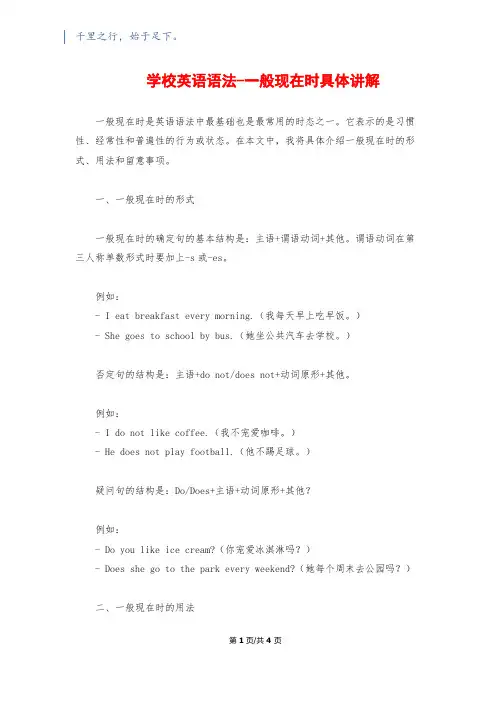
学校英语语法-一般现在时具体讲解一般现在时是英语语法中最基础也是最常用的时态之一。
它表示的是习惯性、经常性和普遍性的行为或状态。
在本文中,我将具体介绍一般现在时的形式、用法和留意事项。
一、一般现在时的形式一般现在时的确定句的基本结构是:主语+谓语动词+其他。
谓语动词在第三人称单数形式时要加上-s或-es。
例如:- I eat breakfast every morning.(我每天早上吃早饭。
)- She goes to school by bus.(她坐公共汽车去学校。
)否定句的结构是:主语+do not/does not+动词原形+其他。
例如:- I do not like coffee.(我不宠爱咖啡。
)- He does not play football.(他不踢足球。
)疑问句的结构是:Do/Does+主语+动词原形+其他?例如:- Do you like ice cream?(你宠爱冰淇淋吗?)- Does she go to the park every weekend?(她每个周末去公园吗?)二、一般现在时的用法第1页/共4页1. 表示习惯或经常性的动作:- I write in my diary every night.(我每天晚上写日记。
)- They play basketball every Sunday.(他们每个星期天打篮球。
)2. 表示客观事实、自然规律或科学真理:- Water boils at 100 degrees Celsius.(水在100摄氏度时煮沸。
)- The sun rises in the east.(太阳从东方升起。
)3. 表示感觉、想法和喜好:- I love chocolate.(我宠爱巧克力。
)- He hates to wake up early.(他厌烦早起。
)4. 表示现时状态或现时临时的动作:- I am a student.(我是一个同学。
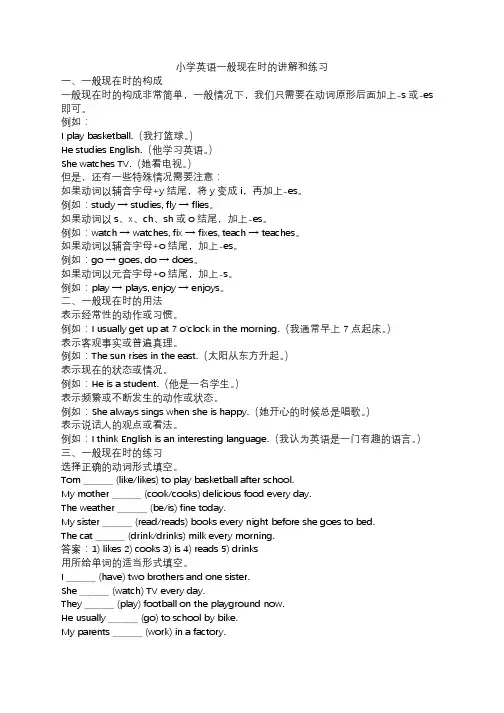
小学英语一般现在时的讲解和练习一、一般现在时的构成一般现在时的构成非常简单,一般情况下,我们只需要在动词原形后面加上-s或-es 即可。
例如:I play basketball.(我打篮球。
)He studies English.(他学习英语。
)She watches TV.(她看电视。
)但是,还有一些特殊情况需要注意:如果动词以辅音字母+y结尾,将y变成i,再加上-es。
例如:study → studies, fly → flies。
如果动词以s、x、ch、sh或o结尾,加上-es。
例如:watch → watches, fix → fixes, teach → teaches。
如果动词以辅音字母+o结尾,加上-es。
例如:go → goes, do → does。
如果动词以元音字母+o结尾,加上-s。
例如:play → plays, enjoy → enjoys。
二、一般现在时的用法表示经常性的动作或习惯。
例如:I usually get up at 7 o'clock in the morning.(我通常早上7点起床。
)表示客观事实或普遍真理。
例如:The sun rises in the east.(太阳从东方升起。
)表示现在的状态或情况。
例如:He is a student.(他是一名学生。
)表示频繁或不断发生的动作或状态。
例如:She always sings when she is happy.(她开心的时候总是唱歌。
)表示说话人的观点或看法。
例如:I think English is an interesting language.(我认为英语是一门有趣的语言。
)三、一般现在时的练习选择正确的动词形式填空。
Tom _______ (like/likes) to play basketball after school.My mother _______ (cook/cooks) delicious food every day.The weather _______ (be/is) fine today.My sister _______ (read/reads) books every night before she goes to bed.The cat _______ (drink/drinks) milk every morning.答案:1) likes 2) cooks 3) is 4) reads 5) drinks用所给单词的适当形式填空。
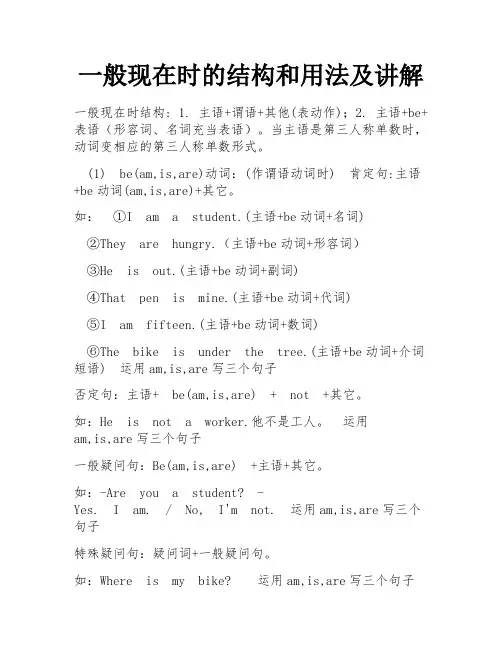
一般现在时的结构和用法及讲解一般现在时结构: 1. 主语+谓语+其他(表动作);2. 主语+be+表语(形容词、名词充当表语)。
当主语是第三人称单数时,动词变相应的第三人称单数形式。
(1) be(am,is,are)动词:(作谓语动词时) 肯定句:主语+be动词(am,is,are)+其它。
如:①I am a student.(主语+be动词+名词)②They are hungry.(主语+be动词+形容词)③He is out.(主语+be动词+副词)④That pen is mine.(主语+be动词+代词)⑤I am fifteen.(主语+be动词+数词)⑥The bike is under the tree.(主语+be动词+介词短语) 运用am,is,are写三个句子否定句:主语+ be(am,is,are) + not +其它。
如:He is not a worker.他不是工人。
运用am,is,are写三个句子一般疑问句:Be(am,is,are) +主语+其它。
如:-Are you a student? -Yes. I am. / No, I'm not. 运用am,is,are写三个句子特殊疑问句:疑问词+一般疑问句。
如:Where is my bike? 运用am,is,are写三个句子特殊疑问句:疑问词(what, where, who, when, which, whose, how, ho w many, how much, what shape,what colour,),找句子中有没有be动词(is, am或者are)或情态动词或者助动词(特殊疑问句:疑问词+be动词(is, am或者are)或情态动词或者助动词+其他?)(2)行为动词:主语+行为动词+(其它)1.主语不是第三人称单数时,肯定句为:主语+动词原形+其它否定式为:主语+don't+动词原形+其它疑问句为:Do+主语+动词原形+其它?e.g. ①We speak Chinese.②Do you speak Chinese? ---Yes, I do. / No, I don't.③They don't speak Chinese. 写三个句子2.当主语是第三人称单数时:(he,she,it,A/An,单独的人或事物:Lily/book)肯定句为:主语+动词(词尾加s或es)+其它。

千里之行,始于足下。
小学英语语法时态讲解与归纳一般现在时一般现在时(Simple Present Tense)是表示经常性、习惯性或普遍性的动作或状态的时态。
它用于描述我们现在经常或总是发生的动作、习惯、经验、事实和固定的真理。
下面是小学英语语法时态讲解与归纳一般现在时的内容:1. 构成一般现在时的肯定句结构为:主语 + 动词原形(第三人称单数加-s)+ 其他。
例如:- I play soccer every Saturday.(我每个星期六踢足球。
)- She eats an apple every morning.(她每天早上吃一个苹果。
)2. 第三人称单数的变化在一般现在时中,第三人称单数的动词要加上-s、-es或-ies。
例如:- She plays soccer every Saturday.(她每个星期六踢足球。
)- He eats an apple every morning.(他每天早上吃一个苹果。
)- My brother watches TV every night.(我的哥哥每天晚上看电视。
)3. 否定句和疑问句第1页/共3页锲而不舍,金石可镂。
- 否定句:在动词前加do not(don't)或does not(doesn't)。
例如:- I don't play soccer every Saturday.(我不是每个星期六踢足球。
)- She doesn't eat an apple every morning.(她不是每天早上吃一个苹果。
)- 疑问句:将助动词do(does)提到主语前。
例如:- Do you play soccer every Saturday?(你每个星期六踢足球吗?)- Does she eat an apple every morning?(她每天早上吃一个苹果吗?)4. 频率副词频率副词用来修饰动词,表示动作发生的频率。

小学英语语法时态一般现在时一般现在时(Simple Present Tense)是英语语法中最基本的一种时态,表示目前正发生的动作、存在的状态或经常性的动作。
以下是关于一般现在时的相关用法和规则。
一、动词的变化:一般现在时中,动词的第三人称单数形式(he、she、it等)需加上-s或-es。
例如:- I play football.(我踢足球。
)- She cooks dinner.(她做晚饭。
)- He watches TV.(他看电视。
)但是,以下情况除外:1. 当动词以某些字母结尾时,在动词后面直接加上-s,而不再加-es。
这些字母包括:-o(goes)、-ss(passes)、-x(fixes)、-ch(watches)、-sh(rushes)等。
例如:- She goes to school.(她去上学。
)- He passes the exam.(他通过了考试。
)2. 当动词以辅音字母+y结尾时,要将y改为i,再加-es。
例如:- He studies English.(他学习英语。
)- She tries her best.(她尽力。
)第1页/共4页3. 当动词以-e结尾时,只需加上-s。
例如:- They write letters.(他们写信。
)- He can dance.(他会跳舞。
)二、用法:1. 描述客观事实或经常性动作:一般现在时常用于描述客观事实或经常性动作。
例如:- Water boils at 100 degrees Celsius.(水沸腾的温度是100摄氏度。
)- I usually go to bed at 10 o'clock.(我通常在10点钟上床睡觉。
)2. 描述现阶段的状态:一般现在时还可用来描述现阶段的状态或对现实情况的评论。
例如:- They live in New York.(他们住在纽约。
)- She looks tired.(她看起来很累。

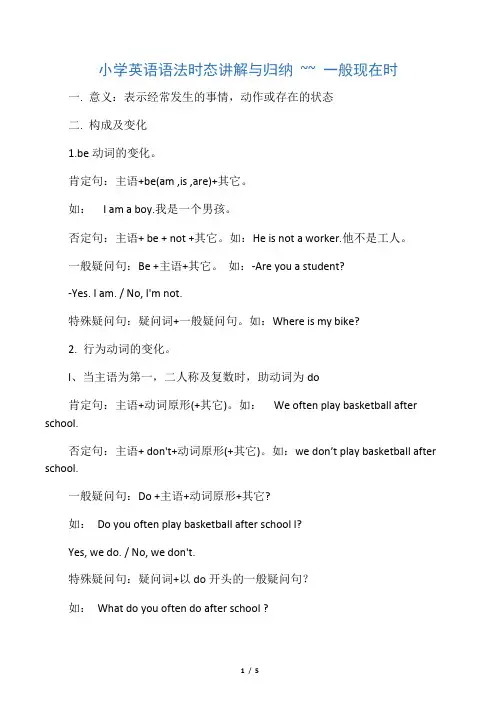
小学英语语法时态讲解与归纳~~ 一般现在时一. 意义:表示经常发生的事情,动作或存在的状态二. 构成及变化1.be动词的变化。
肯定句:主语+be(am ,is ,are)+其它。
如:I am a boy.我是一个男孩。
否定句:主语+ be + not +其它。
如:He is not a worker.他不是工人。
一般疑问句:Be +主语+其它。
如:-Are you a student?-Yes. I am. / No, I'm not.特殊疑问句:疑问词+一般疑问句。
如:Where is my bike?2. 行为动词的变化。
l、当主语为第一,二人称及复数时,助动词为do肯定句:主语+动词原形(+其它)。
如:We often play basketball after school.否定句:主语+ don't+动词原形(+其它)。
如:we don’t play basketball after school.一般疑问句:Do +主语+动词原形+其它?如:Do you often play basketball after school l?Yes, we do. / No, we don't.特殊疑问句:疑问词+以do开头的一般疑问句?如:What do you often do after school ?2、当主语为第三人称单数时,助动词为does肯定句:主语+动词三单式(+其它)。
如:He swims well.否定句:主语+ doesn’t+动词原形(+其它)。
如:He doesn’t swim well..一般疑问句:Does +主语+动词原形+其它。
如:Does he swim well ?Yes, he does. / No, he doesn't.特殊疑问句:疑问词+以does开头的一般疑问句?如:How does your father go to work?三.第三人称单数的动词变化规则(只有在第三人称为主语的肯定句中,动词才用三单式)(1)多数动词直接加s:runs gets likes collets takes plays c limbs…….(2)结尾是s, x, sh, ch, o,前为辅音字母,结尾加es :watches goes does washes brushes(3)动词末尾y前为辅音:将y改为i加es:study→studies fly→flies carry→carries cry→cries但在y前如果为元音则直接加s:buys says四.时间标志:always总是, usually经常, often经常, sometimes 有时,every…每~一般现在时练习题(1)用下列单词的适当形式填空We often___________(play) in the playground.2.He _________(get) up at six o’clock.3.__________you _________(brush) your teeth every morning?4.What________________(do) he usually________________(do) after school?5.Danny ________________(study) English, Chinese, maths, science and Art at school.6.Mike sometimes __________(go) to the park with his sister.7.At eight at night, she __________(watch) TV with his parents.8.________ Mike________(read) English every day?Ⅱ单项选择。
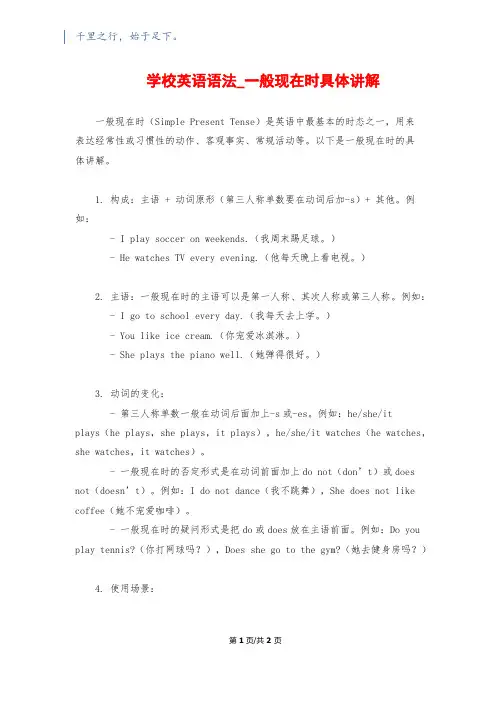
千里之行,始于足下。
学校英语语法_一般现在时具体讲解一般现在时(Simple Present Tense)是英语中最基本的时态之一,用来表达经常性或习惯性的动作、客观事实、常规活动等。
以下是一般现在时的具体讲解。
1. 构成:主语 + 动词原形(第三人称单数要在动词后加-s)+ 其他。
例如:- I play soccer on weekends.(我周末踢足球。
)- He watches TV every evening.(他每天晚上看电视。
)2. 主语:一般现在时的主语可以是第一人称、其次人称或第三人称。
例如:- I go to school every day.(我每天去上学。
)- You like ice cream.(你宠爱冰淇淋。
)- She plays the piano well.(她弹得很好。
)3. 动词的变化:- 第三人称单数一般在动词后面加上-s或-es。
例如:he/she/itplays(he plays,she plays,it plays),he/she/it watches(he watches,she watches,it watches)。
- 一般现在时的否定形式是在动词前面加上do not(don’t)或does not(doesn’t)。
例如:I do not dance(我不跳舞),She does not like coffee(她不宠爱咖啡)。
- 一般现在时的疑问形式是把do或does放在主语前面。
例如:Do you play tennis?(你打网球吗?),Does she go to the gym?(她去健身房吗?)4. 使用场景:第1页/共2页锲而不舍,金石可镂。
- 表达经常性或习惯性的动作。
例如:I eat breakfast every morning.(我每天早上吃早餐。
)- 表达客观事实、普遍真理等。
例如:The sun rises in the east.(太阳从东方升起。
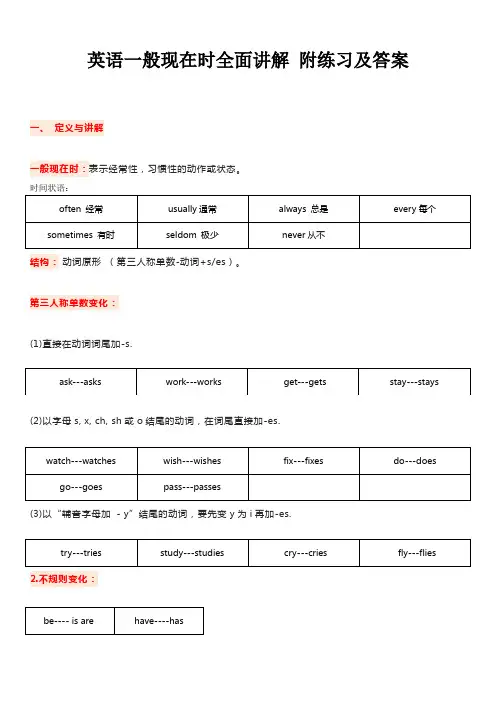
英语一般现在时全面讲解附练习及答案一、定义与讲解一般现在时:表示经常性,习惯性的动作或状态。
结构:动词原形(第三人称单数-动词+s/es)。
第三人称单数变化:(1)直接在动词词尾加-s.(2)以字母s, x, ch, sh或o结尾的动词,在词尾直接加-es.(3)以“辅音字母加- y”结尾的动词,要先变y为i再加-es.2.不规则变化:二、一般现在时用法1. 表示经常性,习惯性,永久性的动作或存在的状态.通常与副词sometimes, often, usually, always, every day (year, month ), once (twice, three times) a day,等时间状语连用。
2. 表示客观真理,科学原理,自然现象,等客观事实或格言,谚语等。
三、一般现在时的句子转换:(1)当句子中有be动词或情态动词时,则把be动词或情态动词(can,could等等)提到主语的前面变成疑问句;在be动词或情态动词后面加not变成否定句.(2)当句子中即没有be动词,也没有情态动词时,则在主语前加助动词do (you,以及复数), does(单数she,he,it)变成问句;在主语后谓语动词前加助动词don’t(I,you,以及复数), doesn’t(单数she,he,it)变成否定句,助动词后的动词要变成动词原形。
名师解析1.________ you often ________ tea?A.Do;drinks B.Does;drink C.Do;drink分析:你经常喝茶吗?根据often可知句子为一般现在时,主语为you,用助动词Do提问,动词用原形,C 符合题意,故选C。
2.My legs .A.hurt B.hurts C.hurting分析:我的腿……。
A痛,动词原形;B痛,动词单三形式,主语是名词复数,谓语动词用原形,排除;C痛,现在分词,用于现在进行时,构成be doing,缺少be,排除。
千里之行,始于足下。
学校英语语法归类讲解-一般现在时学问点讲解思维导图一般现在时是表示经常性或习惯性动作的时态。
下面是学校英语语法归类讲解-一般现在时的学问点讲解思维导图:一般现在时的形式:- 确定句:主语 + 动词原形 + 其他- 否定句:主语 + do not / does not + 动词原形 + 其他- 疑问句:Do / Does + 主语 + 动词原形 + 其他一般现在时的用法:- 表示习惯或常态:I brush my teeth every morning.(我每天早上刷牙。
)- 表示普遍事实:Water boils at 100 degrees Celsius.(水在100摄氏度时沸腾。
)- 表示现在的状态:She is a doctor.(她是一名医生。
)一般现在时特殊状况的变化规章:- 以辅音字母 + y 结尾的动词,变 y 为 i,再加 es:study - studies.(学习)- 以 o 结尾的动词,加 es:go - goes.(去)- 以 s、sh、ch、x、z 结尾的动词,加 es:pass - passes.(通过)- 以辅音字母 + o 结尾的动词,直接加 es:do - does.(做)- 以 f 或 fe 结尾的名词,变 f 或 fe 为 v,再加 es:leaf - leaves.(叶子)- 不规章变化:am / is / are / have / has / don't / doesn't。
第1页/共2页锲而不舍,金石可镂。
一般现在时的时间状语:- 经常性:always, often, usually, sometimes, every day / week / month / year- 频率:once a week, twice a month- 瞬间动作:now, right now, at this moment一般现在时的留意事项:- 第三人称单数主语要加 s 或 es:He likes apples.(他宠爱苹果。
英语一般现在时全面讲解附练习及答案概念1.表示经常性或习惯性的动作,常与表示频度的时间状语连用。
如:al ways, usually, often, sometimes, seldom(很少), never(决不), every day, at 8:30, on Sunday,in the morning等。
如:I always get up at 6:00 in the morning.2.表示现在时刻的状态、能力、性格、个性。
如:She loves English very much. My sister can play the piano very well.3.表示客观的事实。
如:The sun rises in the east. 太阳从东方升起。
4.格言或警句。
如:Pride goes before a fall. 骄者必败。
02句子结构1.如果句子主语的人称是I, we, you, they或复数名词时,动词用动词原形。
如:We often go home by bus.2.如果句子的主语是第三人称单数,即:he, she, it 或单数名词时,动词要用第三人称的单数形式。
如:He often goes home by bus03动词的第三人称单数构成规则1.一般情况下在动词的后面直接加“s”;如:work→works play→plays¬ rain→rains see→sees visit→visits2.以o, x,s,sh, ch结尾的动词,在后面加“es”;如:do→does fix→fixes guess→guesses wash→washes teach→teaches3.以辅音字母加y结尾的动词,先把“y”改为“i”, 再加“es”;如:fly→flies study→studies carry→carries4.不规则变化。
如:have→has04注意在一般现在时的句子中,如果前面使用了助动词does, doesn’t, will, won’t, can, can’t, would, wouldn’t, must, mustn’t 等,尽管主语是第三人称单数,后面的动词用动词原形。
小学英语语法时态讲解与归纳总结英语时态是学习英语语法中非常重要的一部分。
了解和掌握英语时态的用法能够帮助我们准确地表达过去、现在和将来的动作或状态。
本文将对小学英语中常用的时态进行讲解和归纳总结。
一、一般现在时(Simple Present Tense)一般现在时用于表示习惯性、经常性的动作或状态,也可以用来表示客观事实、真理或普遍规律。
一般现在时的构成:主语 + 动词原形(第三人称单数加-s)。
例如:1. I play basketball every weekend.(我每个周末打篮球。
)2. He likes to eat apples.(他喜欢吃苹果。
)3. The sun rises in the east.(太阳从东方升起。
)二、一般过去时(Simple Past Tense)一般过去时用于表示过去发生的动作或状态。
一般过去时的构成:主语 + 动词的过去式(一般在动词原形后加-ed,不规则动词需要特殊记忆)。
例如:1. I watched a movie last night.(我昨晚看了一部电影。
)2. She danced at the party.(她在派对上跳舞。
)3. They visited their grandparents yesterday.(他们昨天去拜访了他们的祖父母。
)三、一般将来时(Simple Future Tense)一般将来时用于表示将来要发生的动作或状态。
一般将来时的构成:主语 + will + 动词原形。
例如:1. We will go shopping tomorrow.(我们明天要去购物。
)2. He will finish his homework later.(他一会儿会完成他的家庭作业。
)3. She will visit her friends next week.(她下周要去拜访她的朋友们。
)四、现在进行时(Present Continuous Tense)现在进行时用于表示现在正在进行的动作。
千里之行,始于足下。
小学英语语法-一般现在时详细讲解一般现在时(Simple Present Tense)是英语中最常用的时态之一,表示经常性的行为、习惯、真理、现在的状态等。
以下是关于一般现在时的详细讲解:1. 用法:- 表示客观真理或事实:The sun rises in the east. (太阳从东方升起。
)- 表示经常性的行为或习惯:He reads books every night. (他每晚都看书。
)- 表示现阶段的状态或现象:She speaks three languages. (她会说三种语言。
)2. 构成:- 肯定句:主语 + 动词原形(第三人称单数形式在动词后加-s或-es)+ 其他。
- 否定句:主语 + do / does not + 动词原形 + 其他。
- 疑问句:Do / Does + 主语 + 动词原形 + 其他?3. 第三人称单数形式的规则:在一般现在时中,第三人称单数形式需要在动词后加-s或-es。
- 如果动词以-s, -sh, -ch, -x, -o结尾,加-es。
如:goes, watches。
- 如果动词以辅音字母+y结尾,将y改为i,再加-es。
如:studies。
- 其他情况直接加-s。
如:reads, eats。
4. 句型转换:第1页/共2页锲而不舍,金石可镂。
- 肯定句变为否定句:将动词前的助动词do / does 变为 do not / does not。
如:I love cats.(肯定句)→ I do not love cats.(否定句) - 肯定句变为疑问句:将助动词do / does提到主语之前。
如:Youlike pizza.(肯定句)→ Do you like pizza?(疑问句)- 否定句变为肯定句:将助动词do / does 去掉。
如:He doesn'tplay tennis.(否定句)→ He plays tennis.(肯定句)- 否定句变为疑问句:将助动词do / does提到主语之前,并去掉not。
一般现在时1.定义一般现在时。
表示经常、反复发生的动作,经常存在的状态或者习惯性动作(有时间规律发生的事件)的一种时间状态。
(很拗口,但是要学会就必须深刻体会)2.基本结构构成表肯定式疑问式否定式否定疑问式I work. Do I work? I do not work. Do I not work?You work. Do you work? You do not work. Do you not work?We work. Do we work? We do not work. Do we not work?They work. Do they work? They do not work. Do they not work?He(She,It) works. Does he(she,it) work? He(She,It) does not work. Does he(she,it) not work?3.形式当主语是第三人称单数时肯定句主语+动词三单+其他否定句主语+doesn't+动词原形+其他一般疑问句 Does+主语+动词原形+其他肯定回答 Yes,主语+does否定回答 No,主语+doesn't特殊疑问句特殊疑问词+一般疑问句当主语不是第三人称单数时肯定句主语+动词原形+其他否定句主语+don't+动词原形+其他一般疑问句 Do+主语+动词原形+其他用错结构全句都错,一定要注意。
4.第三人称单数变化规律情况构成方法?读音?例词?一般情况加 -s 清辅音后读/s/浊辅音和元音后读/z/swim-swims;help-helps;like-likes以o结尾的词加-s或-es读/z/ tomatoes;potatoes;photos以ce,se,ze,ge等结尾的词加 -s读/iz/ prices;cases;oranges以s,sh,ch,x等结尾的词加 -es读/iz/ teach-teaches;bus-buses以辅音字母+y结尾的词变y 为i再加es读/z/ study-studies5.具体用法表示1.表示经常的或习惯性的动作,常与表示频率的时间状语连用。
时间状语: always, usually,regularly,every morning/night/evening/day/week,often,sometimes,occasionally,from time to time,twice a week,rarely,seldom,once a month, hardly, ever,never.e.g. I leave home for school at 7:00 every morning..表示主语具备的性格、能力、特征和状态。
e.g. I don't want so much.Ann Wang writes good English but does not speak well.比较:Now I put the sugar in the cup.I am doing my homework now.3.表示客观事实和普遍真理。
e.g The earth moves around the sun.Shanghai lies in the east of China.4.在时间状语从句和条件状语从句中,常用一般现在时代替将来时。
5.表示预先计划或安排好的行为。
6.小说故事用一般现在时代替一般过去时。
新闻报道类的容,为了体现其“新鲜”性,也用一般现在时来表示过去发生的事情。
7.有些表示状态和感觉的动词表示现在发生的具体行为时,只用一般现在时,而不用进行时态。
8.表示现在发生的具体动作或存在的状态一般现在时用法专练(一)一、写出下列动词的第三人称单数drink ________ go _______ stay ________ make ________look _________ have_______ pass_______ carry ____come________ watch______ plant_______ fly ________study_______ brush________ do_________ teach_______二、用括号动词的适当形式填空。
1. He often ________(have) dinner at home.2. Daniel and Tommy _______(be) in Class One.3. We _______(not watch) TV on Monday.4. Nick _______(not go) to the zoo on Sunday.5. ______ they ________(like) the World Cup?6. What _______they often _______(do) on Saturdays?7. _______ your parents _______(read) newspapers every day?8. The girl _______(teach) us English on Sundays.9. She and I ________(take) a walk together every evening.10. There ________(be) some water in the bottle.11. Mike _______(like) cooking.12. They _______(have) the same hobby.13. My aunt _______(look) after her baby carefully.14. You always _______(do) your homework well.15. I _______(be) ill. I’m staying in bed.16. She _______(go) to school from Monday to Friday.17. Liu Tao _______(do) not like PE.18. The child often _______(watch) TV in the evening.19. Su Hai and Su Yang _______(have) eight lessons this term.20. -What day _______(be) it today?-It’s Saturday.三、按照要求改写句子1. Daniel watches TV every evening.(改为否定句)___________________________________________________2. I do my homework every day.(改为一般疑问句,作否定回答)________________________________________________________3. She likes milk.(改为一般疑问句,作肯定回答)___________________________4. Amy likes playing computer games.(改为一般疑问句,作否定回答)___________________________________________________5. We go to school every morning.(改为否定句)_______________________________________________________6. He speaks English very well.(改为否定句)___________________________________________________7. I like taking photos in the park.(对划线部分提问)________________________________________________________8. John comes from Canada.(对划线部分提问)___________________________________________________9. She is always a good student.(改为一般疑问句,作否定回答)________________________________________________________10. Simon and Daniel like going skating.(改为否定句)___________________________________________________四、改错(划出错误的地方,将正确的写在横线上)1. Is your brother speak English? __________________2. Does he likes going fishing? __________________3. He likes play games after class. __________________4. Mr. Wu teachs us English. __________________5. S he don’t do her homework on Sundays. _________________练习二一、写出下列动词的第三人称单数形式。
(讨论第三人称单数形式的变化规则) Model: clean cleans1) watch __________ 2) have __________3) cook_________ 4) go __________5) fly _________ 6) make _________二.用动词的正确形式填空。
1. We often___________(play) in the playgound.2. He _________(get) up at six o’clock.3. __________you _________(brush) your teeth every morning.4. What__________(do) he usually_________(do) af ter school?5. Danny__________(study)English,Chinese,Maths, Science and Art an school.6. Mike sometimes __________(go) to the park with his sister.7. At eight at night, she __________(watch) TV with hisparents.8. ________ Mike________(read) English every day?9.Tom (swim) in the river now.10.It’s eight o’clock now. The boys (watch) TV.11.She usually (do) her homework in the evening.12.Tom and Tony can’t (swim).13.What does your father ______ (do)? He’s a worker.14.Look! Jim and Tom (run) there.三.改句子1. Do you often play football after school? (肯定回答)2. I have many books. (改为否定句)3. Gao Shan’s sister likes playing table tennis (改为否定句)4. She lives in a small town near New York. (改为一般疑问句)5. I watch TV every day. (改为一般疑问句)6. David has got a goal. (改为一般疑问句)三、选择填空:( )1. Look! LiPing and Li Ying ________ basketball now.A. playB. playsC. are playing( )2. Can I______ this book?A. haveB. hasC. having( )3. I to music at 7:00 this morning.A. listenB. listeningC. listens( )4. What ______ that in the box? A shirt.A. amB. isC. areD. be( )5. Can I TV? Sure.A. watchingB. watchC. see( )6、She like swimming.A. doesn'tB. don'tC. isn't.( )7. Here the money.A. areB. isC. am( )8. There _______ a table and two chairs in Jenny’s room.A. amB. isC. are一般现在时(三)一.用动词的适当形式填空1. She _________(go) to school at seven o’clock.2. It’s 6 o’clock. They are _________ (eat) supper.3. He usually ___________ up at 17:00.(get )4. She ___________ (live) in Beijing.5. Amy _________ (be) here just now.6. _______ (be)there a fly on the table just now?7. My father __________ (watch) TV every evening .8. My father _______________ (make) toys these days.9.________ Amy _________ (read) English every day10. Chen Jie sometimes _________(go)to the park with her sister.二.选择填空1.I want____homework now.A. doingB. to doC. to do myD. do my2.It's time______.A. go to schoolB. play gamesC. to go homeD. to do my homeworks 3.____ you____the blackboard?Yes,I am.A. Can, cleanB. Am, cleaningC. Are, clea ningD. Doclean4.______go and help her.A. Let's meB. Let's usC. Let'sD. Let's to5.What are they doing? They are______things away.A. putB. putingC. puttingD. carry6.Do they have a new car? Yes,_____.D. they doA .they are B.they have C. t hey don't7.He often _________ supper at 6:00 in the evening.A. haveB. has c. is having D. is eating8. It’s 6 o’clock in the morning. He ___________.A. get upB. gets upC. is geting upD. is getting up9. What are you doing? I’m __________ TV.A. watchB. watchesC. to watchD. watching10. We _____________ any Chinese classes on Friday.A. are havingB. aren’t havingC. don’t haveD. are have11. Tom _______ an English class now.A. is havingB. hasC. havingD. have12. Are you playing basketball? No, we ___________.A. isn’tB. aren’tC. notD. don’t13. Listen! The girl _____________ in the room.A. singsB. singingC. is singingD. are singing14. The boy is __________ to his teacher.A. sayingB. speakingC. talkingD. telling三、用括号动词的适当形式填空。